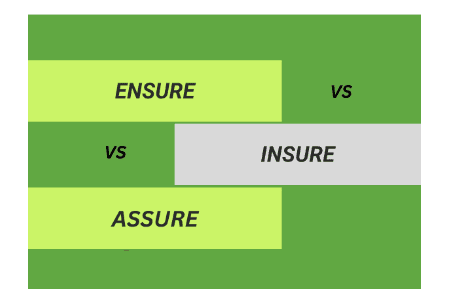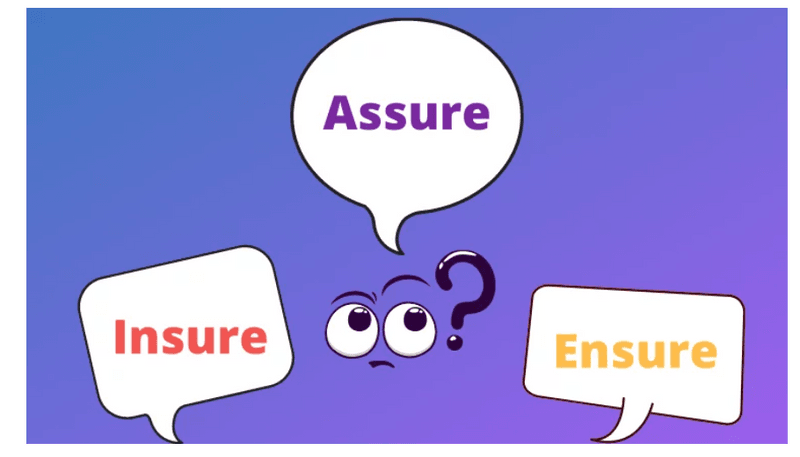Ensure vs Insure vs Assure: A Simple and Insightful Guide

Learning a new language can be really interesting, but it can also be tricky. For people in India who don't speak English as their first language, one big challenge is mixing up words that sound alike. Words like "ensure," "insure," and "assure" are notable ones among them. Even though these words sound similar, they mean different things and are used differently. This mix-up can cause mistakes when writing or talking in English.
This blog post aims to help you understand the differences between these commonly confused words. Once you know when to use 'ensure' vs 'insure' vs 'assure,’ you'll get better at English, speak more smoothly, and feel confident when you communicate. Let's dive in!
What Do Ensure, Insure and Assure Mean?
Let's first clarify the meanings of these often-confused words.
Ensure: To 'ensure' something means to make sure it will occur or to guarantee its occurrence. It is about removing doubt or risk so a desired result becomes certain.
For example, "To ensure you catch the 9 AM train from Delhi to Agra, set your alarm for 7 AM."
Insure: This term is mostly about getting financial protection against loss or damage. So, when you insure something like a car or a house, you're making sure that you're protected financially if something like damage or theft happens.
Example: "Insure your new motorcycle to protect you from financial loss in case of an accident."
Assure: 'Assure' means telling someone something confidently to make sure they don't have any doubts. So, when you assure someone, you're making them feel better by confidently saying something certain.
For instance: "I can assure you that our team will meet the project deadline."
Each term has its unique usage and cannot be used interchangeably. So next time remember to 'ensure' you use the right word, 'insure' your car against damages and 'assure' your friend about your plans!
Ensure vs Insure vs Assure: Correct Usage with Examples
Let's understand the correct usages of 'ensure', 'insure', and 'assure' through an easy-to-follow table. Some relatable examples are also given.
Words | Descriptions | Usage Examples |
Ensure | To make sure or guarantee | "To ensure a good harvest, farmers follow a strict watering schedule." "Ensure you have your passport before leaving for the airport." |
Insure | Related to financial compensation against loss | "Rahul decided to insure his new Maruti Suzuki car." "I will insure my bike immediately." |
Assure | To remove someone's doubts or fears or to promise | "The captain assured the cricket team fans that they would give their best." "I assure you that the train will arrive on time." |
Remember these differences when using 'ensure vs insure vs assure' in your daily English conversations!
Ensure vs Insure vs Assure: Remembering the Difference

Here are some mnemonic devices to remember the meaning and usage of "ensure," "insure," and "assure":
Ensure:
- Mnemonic: "Ensuring is Making Sure and Secure."
- Remember "Ensure" by thinking about securing every need or making things certain.
Insure:
Mnemonic: "Insurance Involves Risk, Secure Everything"
"Insure" relates to insurance, which involves securing against risks or potential losses.
Assure:
- Mnemonic: "Assure Someone Safety, Secure Reassurance"
- "Assure" involves providing reassurance or guaranteeing safety to someone.
These mnemonics help associate each word with its specific meaning and usage. This makes it easier for learners to remember which one to use in different contexts.
For more such useful language tips and practical exercises, check out Clapingo's YouTube video:
Improve Your Vocabulary: The Journey Towards Fluency
Building a strong vocabulary is really important for speaking English fluently. We have seen how tricky it is to understand similar-sounding words like 'ensure', 'insure', and 'assure'. So here are some ways to get better at building vocabulary:
Read books, newspapers or articles online. You'll learn new words and see how they are used in sentences.
Make flashcards to learn words. Write the word on one side of the card and what it means on the other side. Practising with these can help you remember them better.
Check out platforms like Clapingo for helpful tips to improve vocabulary. The Clapingo blog post on "How to Improve Vocabulary in English Online at Home" gives great advice on boosting your vocabulary skills.
Remember, improving your vocabulary is a process that demands regular practice. Keep practising. Before you know it, words like 'ensure', 'insure', and 'assure' will naturally come to you.
Final Thoughts
To wrap up, remember that 'ensure' is about making sure and 'insure' is about financial protection. 'Assure' is about giving comfort or confidence. It might seem hard at first, but with practice, you'll master them in no time.
Clapingo's one-on-one coaching sessions can really boost your grasp of these language details. Remember, being able to communicate clearly and correctly in English is important for doing well in your personal and work life. So keep learning and keep practising - English fluency is at your fingertips!
FAQs
1. Is ‘ensure’ a synonym for ‘assure’?
While they may seem similar, 'ensure' and 'assure' aren't synonyms. 'Ensure' means to make certain something will occur. 'Assure' means to promise or confirm something to someone.
2. What can I use instead of ‘ensure’?
You can use words like "guarantee", "confirm", or "make certain" instead of ‘ensure’. The choice of words depends on the context.
3. Is ‘I assure you’ correct?
Yes, using ‘I assure you’ is correct when you want to confirm or promise something to someone.
Comments
Your comment has been submitted